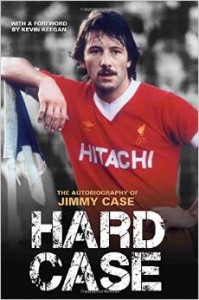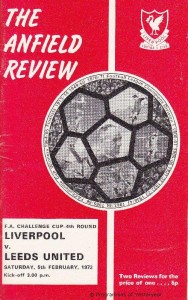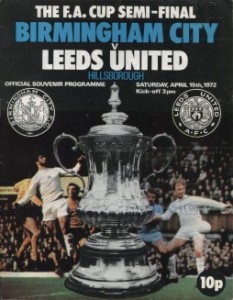Book Review: Bobby Stokes: The man from Portsmouth who scored Southampton’s most famous goal by Mark Sanderson
 Whenever FA Cup Final day comes around each season, you can be sure that a montage of winning goals from the Final’s down the years will be shown on television.
Whenever FA Cup Final day comes around each season, you can be sure that a montage of winning goals from the Final’s down the years will be shown on television.
The games are invariably tight, tense affairs and so often the day is won with just a single strike. Take the last ten Finals from 2006/07 (Chelsea vs. Manchester United) to 2015/16 (Manchester United vs. Crystal Palace) – five of these games finished 1-0. Inevitably the scorer becomes feted as the hero, with their name going down in the history books.
Bobby Stokes is one of those who will be remembered as scoring the winning goal in the FA Cup Final.
On Saturday 01 May 1976, First Division Manchester United played Second Division Southampton. United had finished third that season and Saints in sixth spot and the club from Manchester were red-hot favourites. However, with extra-time looking increasingly likely, on eighty-three minutes, a flicked ball inside from Mike Channon to Jim McCalliog was put through over the top of the United defence, which Bobby Stokes hit first-time low beyond the despairing dive of Alex Stepney in the United goal. The winning goal.
Sadly, just nineteen years later and aged just 44 Bobby Stokes died.
In Bobby Stokes: The man from Portsmouth who scored Southampton’s most famous goal, author Mark Sanderson is clear in stating that, “the book is not an analysis of every game Bobby ever played in, nor is it a blow-by-blow account of his entire life; that would be tricky, as sadly Bobby is no longer with us to re-tell it”, but adds, “he is brought to life in this book through the eyes of those who knew him, it is their voices and memories that tell the story”.
It is a story which takes the reader through from Bobby growing up in the Portsmouth stronghold of Paulsgrove, his playing career in England and in America, his life after football and his untimely death in 1995, through those that knew Bobby Stokes.
He was a Pompey fan growing up and he seemed destined to play for the club, but ironically was taken on by rivals Southampton as an apprentice instead, making his debut for them in 1969. Playing colleagues talk of his industry and goal scoring talent during his Saints career of which 1976 was the pinnacle. Within 12 months he moved on to sign for Portsmouth in what was a brief and difficult period for Pompey. The USA loomed next for Stokes and he played in the summer months in the North American Soccer League (NASL) for the Washington Diplomats, where he lined up with and against such world stars as Pele and Johann Cruyff. Those spells were his last as a professional as when he returned to the UK in the winter months he turned out for non-league teams, Waterlooville, Cheltenham Town and Chichester City.
Once he finished playing Stokes became a pub landlord, as many footballers did then. However, this was not a success and his life became more difficult as he separated from his wife and ended up working in his cousin’s harbour side café in Portsmouth. Then on 30 May 1995 Bobby Stokes died of bronchial pneumonia.
The perception from the book is that Bobby Stokes was a decent guy, nobody has a bad word to say about him, and that he wasn’t one to boast about the Cup Final winning goal. It gives an impression that he wasn’t one for the limelight, and given that this book has to create a picture of the man through others words, he feels perhaps unsurprisingly ethereal.
The author wanted the book to, “serve as a sympathetic, but hopefully objective assessment of Bobby’s life and career”. It is certainly sympathetic, since Sanderson only ever hints at the issues that Bobby Stokes suffered after his playing days ended and which led to his sad death. It could be viewed that it is perhaps too sympathetic in that the problems of Stokes’ later life could have been made more explicit as a lesson for others to heed. However, it serves as a timely reminder of the issues that players face once their playing days are over, then and now.
Bobby Stokes will forever be linked with FA Cup Final history and this book is a fitting tribute to the man who scored the winning goal that day and of football in a very different era.
 During my teenage years, Liverpool were the dominant team in England winning numerous domestic and European titles. Part of that side was Jimmy Case a Scouser with a reputation as a hard man.
During my teenage years, Liverpool were the dominant team in England winning numerous domestic and European titles. Part of that side was Jimmy Case a Scouser with a reputation as a hard man. “On what grounds are you applying to read English at Liverpool of all places?” my mystified English teacher asked me. How could I tell him the grounds were Anfield and Goodison Park?
“On what grounds are you applying to read English at Liverpool of all places?” my mystified English teacher asked me. How could I tell him the grounds were Anfield and Goodison Park?
 With the break due to the International fixtures, its aim is to encourage supporters to get to a non-league game this Saturday. There is a map (from the Find a Club tab), which is useful in that you can put in your postal address and it shows details of fixtures local to you. For me this Saturday I’ll be off to see the Evo-Stik First Division North fixture between Garforth Town and Lancaster City. Enjoy!
With the break due to the International fixtures, its aim is to encourage supporters to get to a non-league game this Saturday. There is a map (from the Find a Club tab), which is useful in that you can put in your postal address and it shows details of fixtures local to you. For me this Saturday I’ll be off to see the Evo-Stik First Division North fixture between Garforth Town and Lancaster City. Enjoy!